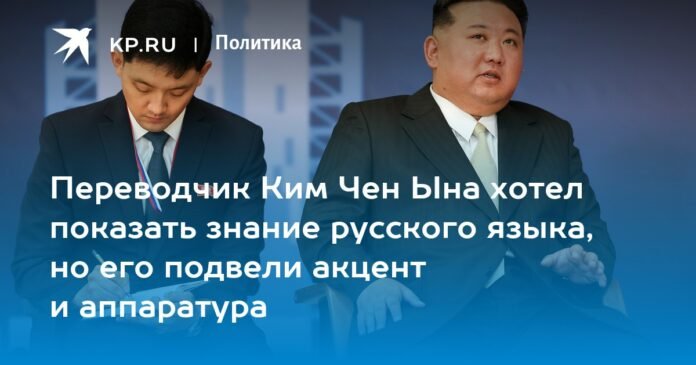Users’ ears, spoiled by Internet memes, heard selective Russian obscenities in the translator’s words when Comrade Kim toasted.
Photo: TASS
“Kim Jong-un’s translator messed something up with the translation.” Telegram channels erupted in confusion during the broadcast of the official dinner that Vladimir Putin offered at the Vostochny cosmodrome in honor of his guest, the leader of the DPRK.
Users’ ears, spoiled by Internet memes, heard selective Russian obscenities in the translator’s words when Comrade Kim toasted:
“The moment I entered Russian soil, I felt a fighting spirit and… [удручающую] reality,” the translator supposedly said.
“Komsomolskaya Pravda”, as part of a joint project with the fact-checking resource “Noodle Media” to debunk fakes, decided to check what the North Korean leader really said.
It turned out that Comrade Kim didn’t mean anything bad. Quite the opposite. He stated that “from the first moment of my arrival on Russian soil I felt a fighting spirit and a boiling reality.” The full transcript of the Russian leader’s gala dinner in honor of his North Korean colleague is posted on the Kremlin’s official website.
Furthermore, to check translator Kim’s speech, ANO’s Dialogue Regions colleagues turned to their special Zephyr* algorithms. And it turned out that the original song does not sound at all like Russian obscenities, but rather the same “lush reality” that the Kremlin’s official website tells us about. And the distorted perception on the part of the Russian ear is due to the slight accent of the speaker (the translator is Korean, and no matter how well he learns to speak the language without an accent, he still will not learn), as well as the “hint” from the foot from photo to video, where they are already “explaining” to us what we should hear in the video.
Furthermore, linguistics experts explained how even the most educated Russians could hear rudeness from the lips of a translator, even at such a high level. The fact is that the phrase “lush reality” is not very Russian. In Russian speech, even the word “lush” is practically not used, especially in combination with “reality.” But in combination with a bad word, which many have heard, regularly, so that the Russian ear hears what is most familiar to it.
In general, the translator was disappointed by his sincere desire to show the depth of his knowledge of the Russian language, coupled with a slight accent and imperfect equipment.
*Zephyr algorithms are a special system of Dialogue Regions ANO, which monitors audio and video materials (including deepfakes) by transcription, then evaluates them using its own algorithms and, as a result, performs analysis using Artificial Intelligence.
When sound enters the system, it is decomposed into fragments, then converted into a log-Mel spectrogram, and then transmitted to the encoder. And this encoder decrypts the segment using several special tokens, each of which performs different tasks: identifying the language, placing phrase-level timestamps, and performing multilingual speech transcription.

